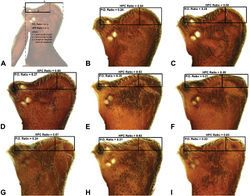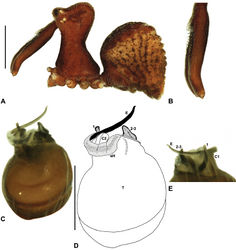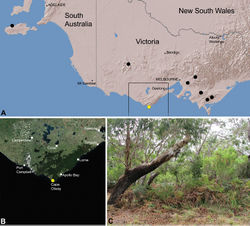Zephyrarchaea porchi
| Notice: | This page is derived from the original publication listed below, whose author(s) should always be credited. Further contributors may edit and improve the content of this page and, consequently, need to be credited as well (see page history). Any assessment of factual correctness requires a careful review of the original article as well as of subsequent contributions.
If you are uncertain whether your planned contribution is correct or not, we suggest that you use the associated discussion page instead of editing the page directly. This page should be cited as follows (rationale):
Citation formats to copy and paste
BibTeX: @article{Rix2012ZooKeys191, RIS/ Endnote: TY - JOUR Wikipedia/ Citizendium: <ref name="Rix2012ZooKeys191">{{Citation See also the citation download page at the journal. |
Ordo: Araneae
Familia: Archaeidae
Genus: Zephyrarchaea
Name
Zephyrarchaea porchi Rix & Harvey sp. n. – Wikispecies link – ZooBank link – Pensoft Profile
Vernacular name
Otway Range Assassin Spider
Type material
Holotype male: Bimbi Park, 2.2 km N. of Cape Otway Lighthouse, Victoria, Australia, 38°50'13"S, 143°30'55"E, dry pitfall trap, grassy edge of bracken-rich dry sclerophyll forest, 2–5.XI.2011, N. Porch & Deakin University Wildlife Field Studies students (MV K11581).
Etymology
The specific epithet is a patronym in honour of Dr Nicholas Porch, for first discovering this species in the Otway Range.
Diagnosis
Zephyrarchaea porchi can be distinguished from Zephyrarchaea janineae and Zephyrarchaea mainae by the absence of dorsal hump-like tubercles on the abdomen (Fig. 18A); from Zephyrarchaea marae and Zephyrarchaea vichickmani by the presence of a proximal tuft of accessory setae on the male chelicerae (Fig. 18B); from Zephyrarchaea barrettae and Zephyrarchaea melindae by the shape of tegular sclerites 2–3, which project well beyond the retro-distal rim of the tegulum (Figs 18C–D); and from Zephyrarchaea marki by the smaller, less protuberant proximal bulge on the male chelicerae (Fig. 18B).
Description
Holotype male: Total length 2.77; leg I femur 1.97; F1/CL ratio 1.86. Cephalothorax dark reddish-brown; legs tan brown with darker annulations; abdomen mottled grey-brown and beige, with reddish-brown dorsal scute and sclerites (Fig. 18A). Carapace relatively short (CH/CL ratio 1.70); 1.06 long, 1.81 high, 1.00 wide; ‘neck’ 0.58 wide; highest point of pars cephalica (HPC) near posterior third of ‘head’ (ratio of HPC to post-ocular length 0.69), carapace with pronounced concave depression anterior to HPC; ‘head’ moderately elevated dorsally (post-ocular ratio 0.27) (Fig. 8D). Chelicerae with proximal tuft and additional comb of accessory setae on anterior face of paturon (Fig. 18B). Abdomen 1.59 long, 1.08 wide; almost spherical in lateral profile, without dorsal hump-like tubercles; dorsal scute fused anteriorly to epigastric sclerites, extending posteriorly to cover anterior two-thirds of dorsal abdomen. Partially expanded pedipalp (Figs 18C–E) bulbous-pyriform, with gently curved, tapering embolus adjacent to conductor sclerites 1–2; tegular sclerite 1 (TS 1) porrect, slightly curved in prolateral view, with flattened, rounded apex; TS 2–3 projecting well beyond retro-distal rim of tegulum.
Female: Unknown.
Distribution and habitat
Zephyrarchaea porchi is known only from north of Cape Otway, in the Otway Range of southern Victoria (Fig. 28). The single known specimen was collected in a dry vertebrate pitfall trap in eucalypt forest with a dense bracken fern understorey.
Conservation status
This species has an imperfectly known distribution, and although potentially restricted, the abundance of protected forested habitats near the type locality would suggest that the species is unlikely to be of conservation concern.
Original Description
- Rix, M; Harvey, M; 2012: Australian Assassins, Part II: A review of the new assassin spider genus Zephyrarchaea (Araneae, Archaeidae) from southern Australia ZooKeys, 191: 1-62. doi
Images
|


